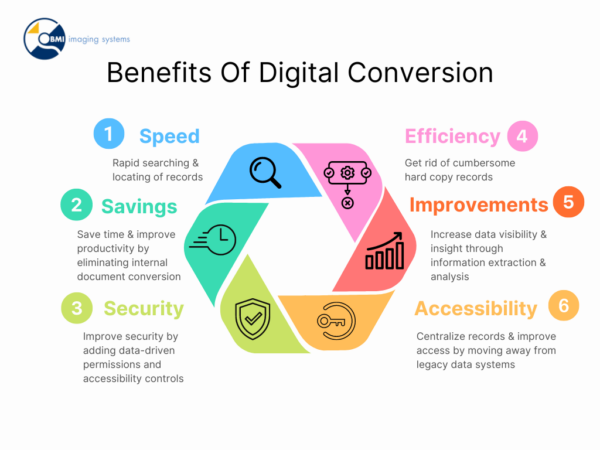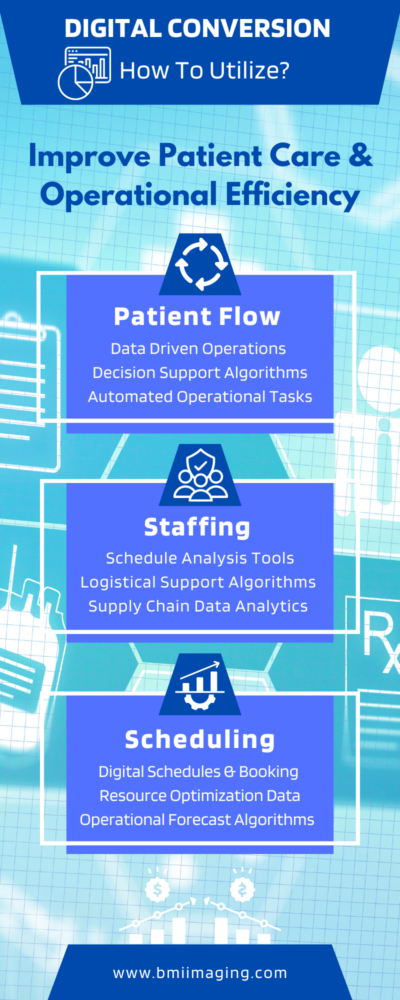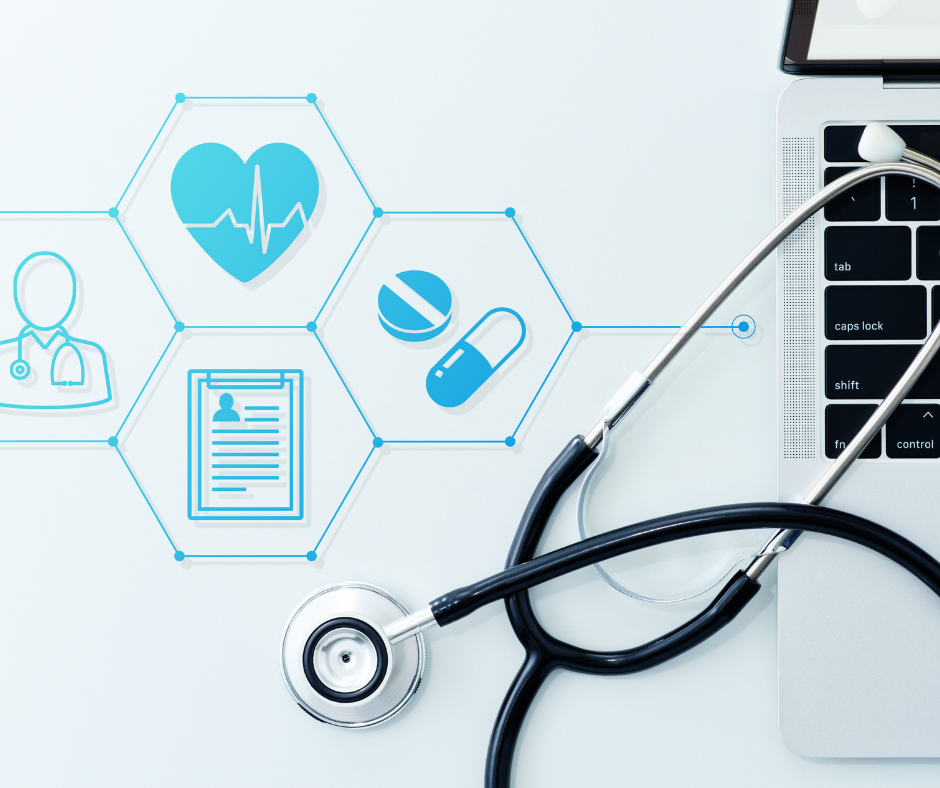When people hear digital conversion in healthcare, they probably think of EMR systems and converting documents/data into electronic medical records.
However, digitization represents much more than standardized document scanning and file conversion. The value of digital conversion is in its ability to create, modify, and streamline business processes. It’s the first step towards achieving future digital transformation initiatives while clearing pathways for organizational growth and collaboration.
After successful implementation, the benefits of digitization quickly multiply throughout a company by providing digital solutions to unmet needs. As digital conversion makes processes easier for employees, it helps them to save time and increases their productivity. With mobile access to digital documents and data management systems, digitization helps healthcare professionals to invest more quality time with patients while optimizing business resources.
In this blog, we’ll discuss how digital conversion improves patient care and highlight some of the innovative opportunities digitization creates for healthcare organizations to leverage new technologies and advancements in data analytics to improve clinical and operational decision making.
What Is Digital Conversion?
Digital conversion (or digitization) is the process of scanning and converting records from analog to digital format. For example, scanning source material such as hard copy records and historical documents and converting them into an electronic format.
There are numerous benefits of digital conversion but two of the most significant are the speed and access it provides to important business information/documents while ensuring standardization across business departments.
Curious how digital conversion can potentially help your organization? We’ve listed some benefits here for you to explore.

Improving Patient Care With Digitization
Digitization enables healthcare professionals to adapt and evolve, in order to better meet the needs and demands of today’s healthcare system. It clears obstacles and alleviates pain points like the frustration of manually managing paper documents and record systems by providing digital solutions to streamline and improve business operations.
Digital conversion helps to fill in the gaps to unmet needs including mobile access to clinical documents, patient files, and secure healthcare information management. This is where digitization has the ability to improve patient care by utilizing digital technologies to collect data, establish trends, and identify opportunities, which ultimately helps healthcare providers to make better and more informed clinical decisions.
Improving Operational Decision-Making & Efficiency
With digital conversion healthcare organizations are able to create new pathways for growth and seamlessly integrate new technologies into their operational/IT systems. It allows healthcare providers and professionals to access data and clinical information on-demand while utilizing digital technology at their fingertips to customize their patients’ treatment plans and to better manage their healthcare needs. By converting to a digital format, healthcare organizations provide their employees with the tools they need for secure access to important business documents, patient files, and health management information.
With digitization organizations are able to customize and improve their business operations. By making processes easier for employees, it helps them to be more productive and effective in their jobs.
Let’s discuss how digital conversion impacts patient care in these three key areas:
- Patient flow
- Staffing
- Scheduling

Patient Flow
In order to manage patient flow, three things have to be done. Provide the right care & treatment to the right patient at the right time.
Healthcare providers must accurately evaluate patients’ needs, correctly diagnose/treat, and manage hospital resources effectively. The challenge typically is with managing hospital resources especially since Covid has already strained resources/staff and maximized capacity.
With digital conversion, hospitals are able to better manage operational tasks and business processes including previous challenges like resource optimization. By successfully implementing digital management systems and technologies, they are now able to create, modify, and streamline operational processes to better meet their objectives.
Here’s an overview of some examples of how digital conversion can help to improve patient flow:
- Data driven operational support systems to provide valuable insights and information to help support triage, admissions, and discharge decisions.
- Decision-support algorithms can be designed to assist with decisions when costs and benefits need to be “weighed” and carefully considered, in order, to make the appropriate recommendations. They can also provide insights into predicting things like admissions, discharges, and transfers.
- Automated operational tasks improve patient flow by strategically leveraging insights from AI and algorithms to better manage operational tasks and streamline processes.
Staffing: Data Analytics and Algorithms
Digital conversion creates opportunities to improve staffing efficiency by utilizing data to better manage staff processes. With digitized management systems, data analytics can also help with operational decisions for staffing nurses.
By using algorithms to predict RN absenteeism rates and to determine when “surge staffing” is needed, healthcare administrations are able to appropriately allocate the right number of floaters for nursing staff. For example, digital technology can assist with supply chain management and logistics to effectively manage capacity.
Rather than waste time with calls, texts, and scheduling spreadsheets to make staffing decisions, nurses and administrators can use analytics to streamline this process, which improves productivity and saves valuable time.
Digital conversion also helps to improve employee efficiency and scheduling by leveraging data analytics to optimize team staffing. With digital data, hospitals can develop team compositions to help providers to work effectively together as a team. Team compositions will provide value to patient care as the ideal blend of various levels of experience and different roles are all combined together and built to deliver quality care for patients.

Scheduling
Digital document management, such as electronically capturing and storing patient documents/files, helps to improve patient care on multiple levels. Digital records improve scheduling and resource management by eliminating manual data entry processes that only delay productivity. Digital scheduling utilizes advancements in tech and AI to predict outcomes, procedure durations, and predict time for patient recovery after surgery.
Benefits to Digital Scheduling:
- Book operating rooms online
- Optimized schedules based on research
- Operational predictions to enhance scheduling and improve productivity
- Scheduling surgical procedures with AI predictions for durations, complications, post op:
- Surgical assistance with predicting anesthesia durations and helping with post op complications
- Predicting each patient outcome and how much and long anesthesia should be given
- Using analytics to help prevent complications and delays in the operating room and with recovery
With digital conversion, healthcare organizations create a foundation for success and a platform for implementing future digital transformation opportunities, which helps them to build a strategic competitive advantage within their market by improving business processes, increasing operational efficiency, and enhancing both the culture and user experiences.
Next Steps
Reach out to us today! Click the “Get Your Quote” button below, fill out the form, and we’ll quickly reply to you to discuss your project.
Further Reading
Take a look at three other articles about healthcare and digital conversion:
“HIPAA Compliance and Document Conversion” covers patient data privacy, data security, and the solutions to protect sensitive file in the healthcare industry. Learn how to implement scanning solutions to convert you medical records to digital while ensuring that patient privacy and HIPAA standards are met.
“Digital Conversion: What Problem Are You Solving?” provides digital conversion tips to ensure you’re solving the right problem when you decide to scan your records, and that your project is a success.
“The BMI Milestone 1 Proof Of Concept Process” is our method of creating your digital conversion project so that we make sure you’re happy when the project’s complete. Our three-phased approach (build, test, refine) is a critical step in making sure your project is crafted properly and starts off in the right direction.

